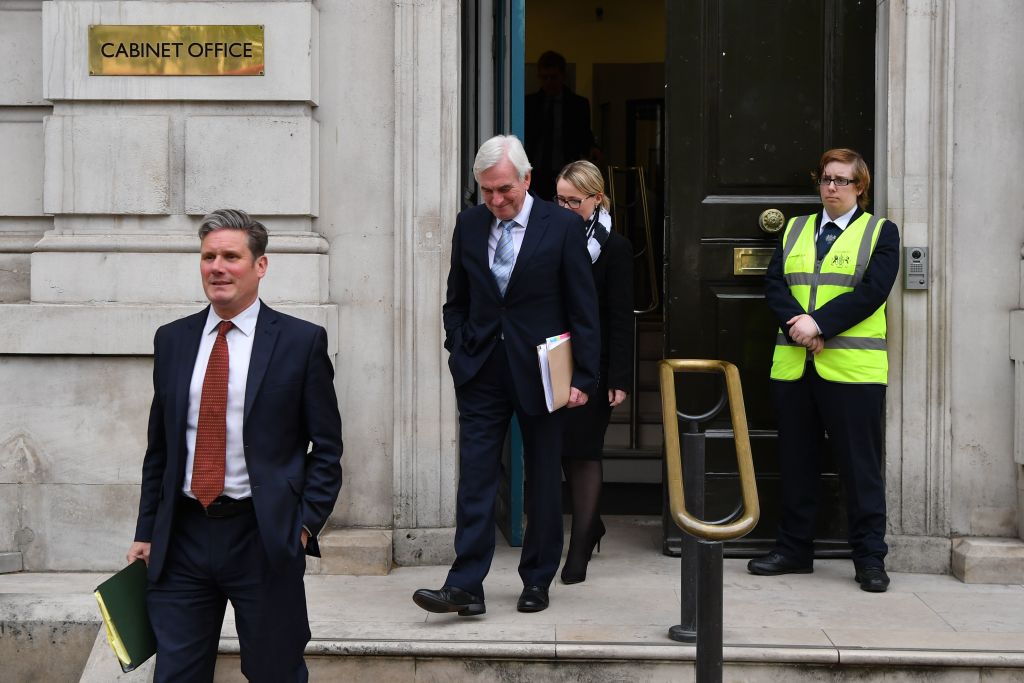John McDonnell, Corbyn’s right hand man for four and a half years, was full of praise when asked about the official opposition’s handling of the Covid crisis. ‘Keir’s got this exactly right’ the ex-shadow chancellor told John Pienaar. But many of Corbyn’s loyal supporters didn’t agree; sparking an internal Labour argument between the party’s warring sides. It is tempting to point to the scrap and claim that it is yet more evidence of the difficulties Starmer faces to get Labour winning again, as the party’s internal battles never seem to end and in fact, are now being fought out between ever smaller factions. But another, more positive way for Starmer to interpret this row (and other interfactional arguments in Labour) is to show all too clearly that he no longer needs to fear his party’s far-left.
Of course, Starmer could soon come unstuck and much depends on what happens over the next three and a half years. But until Starmer loses an election, the Labour left have relegated themselves to little more than a minor annoyance for the remainder of his time as leader. In fact, they may be helping Starmer as he aims to reposition his party with the electorate – just look at how the sacking of Rebecca Long-Bailey worked towards his overarching mission. The public punishing of one of his MPs from the left may become a useful, ongoing button to press in times of need.
The left of Labour – through missteps, infighting and general incompetence – have quickly played themselves into a corner
The fall of Labour’s left from what looked like an unassailable position within their party is one of the most fascinating stories from the past few years of British politics – and that is set against some tough competition. It seems hard to believe now, but they controlled every lever of power within the party before Starmer became leader. Even after the catastrophic loss in December, it still seemed inconceivable that they could end up so powerless, so fast. They vastly underestimated Keir Starmer and the price they have paid for that is something to behold.
The left of Labour – through missteps, infighting and general incompetence – have quickly played themselves into a corner where they now have very few options. They can leave en masse, yet that simply hands the party fully to Starmer, without even the hope of coming back should the current leadership fail. The leading left figures who occupy high positions within trade unions can carry through on their threat to disaffiliate, but they’ll only be shooting themselves in the foot. Labour could obtain money away from the trade unions – now that Corbyn is gone, old donors are returning to the party – whereas disaffiliation would destroy the trade union movement in this country for good. That brings us to the best option of a bad bunch for the Labour left: stay in the party, keep trying to tear Starmer down in the hope that he fails, then blame it all on ‘centrism’ with the aim of regaining everything they have lost. This last option seems to be the road they are taking.
This ‘get Starmer’ path is risky, however. The Labour left could very well end up making themselves seem so irrelevant that most of their current supporters get fed up and abandon them. The closer the next general election comes, the more the choice between Keir Starmer and another five years of Tory government will sharpen left-wing minds. If the left of Labour appears to be sabotaging their own party, they could be ostracised even further. They will, of course, point to their belief that this is exactly what the right and centre of Labour did to Corbyn in 2017 and 2019, but to no avail; only the most deluded supporter really thought Corbyn stood a chance of getting a majority in 2019. If Labour is comfortably ahead in the polls come 2024, the pressure to unite behind a moderate Labour win could crush the parts of the left that refuse to go along for the ride.
All of this should matter to the Conservative party, too. They will end up disappointed if they are hoping for Labour infighting to drag the opposition down. When even darlings of the left such as John McDonnell see that backing Starmer is the only reasonable path for the time being, a more united Labour party gains potential in a way that should be disconcerting to Boris Johnson and his team. In other words, it looks less and less likely that the Labour party will defeat themselves at the next election. With Labour’s far left little more than an irrelevance come the next general election, the Tories will lose a valuable weapon in their fight to stay in government.







Comments